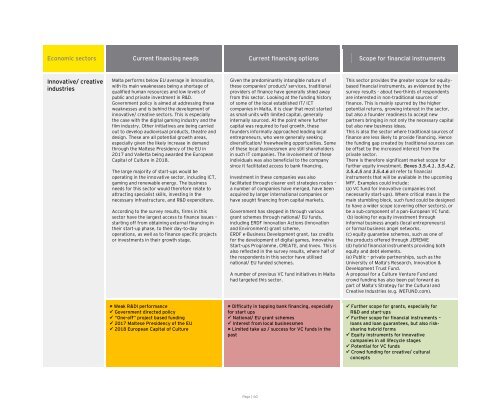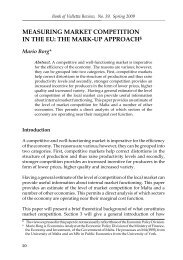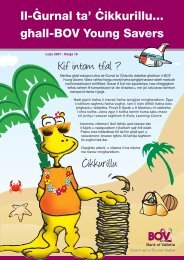Market Gaps on Access to Finance - Bank of Valletta
Market Gaps on Access to Finance - Bank of Valletta
Market Gaps on Access to Finance - Bank of Valletta
Create successful ePaper yourself
Turn your PDF publications into a flip-book with our unique Google optimized e-Paper software.
Ec<strong>on</strong>omic sec<strong>to</strong>rs Current financing needs Current financing opti<strong>on</strong>s Scope for financial instruments<br />
Innovative/ creative<br />
industries<br />
Malta performs below EU average in innovati<strong>on</strong>,<br />
with its main weaknesses being a shortage <strong>of</strong><br />
qualified human resources and low levels <strong>of</strong><br />
public and private investment in R&D.<br />
Government policy is aimed at addressing these<br />
weaknesses and is behind the development <strong>of</strong><br />
innovative/ creative sec<strong>to</strong>rs. This is especially<br />
the case with the digital gaming industry and the<br />
film industry. Other initiatives are being carried<br />
out <strong>to</strong> develop audiovisual products, theatre and<br />
design. These are all potential growth areas,<br />
especially given the likely increase in demand<br />
through the Maltese Presidency <strong>of</strong> the EU in<br />
2017 and <strong>Valletta</strong> being awarded the European<br />
Capital <strong>of</strong> Culture in 2018.<br />
The large majority <strong>of</strong> start-ups would be<br />
operating in the innovative sec<strong>to</strong>r, including ICT,<br />
gaming and renewable energy. The business<br />
needs for this sec<strong>to</strong>r would therefore relate <strong>to</strong><br />
attracting specialist skills, investing in the<br />
necessary infrastructure, and R&D expenditure.<br />
According <strong>to</strong> the survey results, firms in this<br />
sec<strong>to</strong>r have the largest access <strong>to</strong> finance issues –<br />
starting <strong>of</strong>f from obtaining external financing in<br />
their start-up phase, <strong>to</strong> their day-<strong>to</strong>-day<br />
operati<strong>on</strong>s, as well as <strong>to</strong> finance specific projects<br />
or investments in their growth stage.<br />
Weak R&DI performance<br />
Government directed policy<br />
“One-<strong>of</strong>f” project based funding<br />
2017 Maltese Presidency <strong>of</strong> the EU<br />
2018 European Capital <strong>of</strong> Culture<br />
Given the predominantly intangible nature <strong>of</strong><br />
these companies’ product/ services, traditi<strong>on</strong>al<br />
providers <strong>of</strong> finance have generally shied away<br />
from this sec<strong>to</strong>r. Looking at the funding his<strong>to</strong>ry<br />
<strong>of</strong> some <strong>of</strong> the local established IT/ ICT<br />
companies in Malta, it is clear that most started<br />
as small units with limited capital, generally<br />
internally sourced. At the point where further<br />
capital was required <strong>to</strong> fuel growth, these<br />
founders informally approached leading local<br />
entrepreneurs, who were generally seeking<br />
diversificati<strong>on</strong>/ freewheeling opportunities. Some<br />
<strong>of</strong> these local businessmen are still shareholders<br />
in such IT companies. The involvement <strong>of</strong> these<br />
individuals was also beneficial <strong>to</strong> the company<br />
since it facilitated access <strong>to</strong> bank financing.<br />
Investment in these companies was also<br />
facilitated through clearer exit strategies routes –<br />
a number <strong>of</strong> companies have merged, have been<br />
acquired by larger internati<strong>on</strong>al companies or<br />
have sought financing from capital markets.<br />
Government has stepped in through various<br />
grant schemes through nati<strong>on</strong>al/ EU funds,<br />
including ERDF Innovati<strong>on</strong> Acti<strong>on</strong>s (Innovati<strong>on</strong><br />
and Envir<strong>on</strong>ment) grant scheme,<br />
ERDF e-Business Development grant, tax credits<br />
for the development <strong>of</strong> digital games, Innovative<br />
Start-ups Programme, CREATE, and Invex. This is<br />
also reflected in the survey results, where half <strong>of</strong><br />
the resp<strong>on</strong>dents in this sec<strong>to</strong>r have utilised<br />
nati<strong>on</strong>al/ EU funded schemes.<br />
A number <strong>of</strong> previous VC fund initiatives in Malta<br />
had targeted this sec<strong>to</strong>r.<br />
Difficulty in tapping bank financing, especially<br />
for start ups<br />
Nati<strong>on</strong>al/ EU grant schemes<br />
Interest from local businessmen<br />
Limited take up / success for VC funds in the<br />
past<br />
Page | 60<br />
This sec<strong>to</strong>r provides the greater scope for equitybased<br />
financial instruments, as evidenced by the<br />
survey results - about two-thirds <strong>of</strong> resp<strong>on</strong>dents<br />
are interested in n<strong>on</strong>-traditi<strong>on</strong>al sources <strong>of</strong><br />
finance. This is mainly spurred by the higher<br />
potential returns, growing interest in the sec<strong>to</strong>r,<br />
but also a founder readiness <strong>to</strong> accept new<br />
partners bringing in not <strong>on</strong>ly the necessary capital<br />
but also new business ideas.<br />
This is also the sec<strong>to</strong>r where traditi<strong>on</strong>al sources <strong>of</strong><br />
finance are less likely <strong>to</strong> provide financing. Hence<br />
the funding gap created by traditi<strong>on</strong>al sources can<br />
be <strong>of</strong>fset by the increased interest from the<br />
private sec<strong>to</strong>r.<br />
There is therefore significant market scope for<br />
further equity investment. Boxes 3.5.4.1, 3.5.4.2,<br />
3.5.4.5 and 3.5.4.6 all refer <strong>to</strong> financial<br />
instruments that will be available in the upcoming<br />
MFF. Examples could include:<br />
(a) VC fund for innovative companies (not<br />
necessarily start-ups). Where critical mass is the<br />
main stumbling block, such fund could be designed<br />
<strong>to</strong> have a wider scope (covering other sec<strong>to</strong>rs), or<br />
be a sub-comp<strong>on</strong>ent <strong>of</strong> a pan-European VC fund.<br />
(b) looking for equity investment through<br />
informal business angels (local entrepreneurs)<br />
or formal business angel networks.<br />
(c) equity guarantee schemes, such as <strong>on</strong>e <strong>of</strong><br />
the products <strong>of</strong>fered through JEREMIE<br />
(d) hybrid financial instruments providing both<br />
equity and debt elements.<br />
(e) Public – private partnerships, such as the<br />
University <strong>of</strong> Malta’s Research, Innovati<strong>on</strong> &<br />
Development Trust Fund.<br />
A proposal for a Culture Venture Fund and<br />
crowd funding has also been put forward as<br />
part <strong>of</strong> Malta’s Strategy for the Cultural and<br />
Creative Industries (e.g. WEFUND.com).<br />
Further scope for grants, especially for<br />
R&D and start-ups<br />
Further scope for financial instruments –<br />
loans and loan guarantees, but also risksharing<br />
hybrid forms<br />
Equity instruments for innovative<br />
companies in all lifecycle stages<br />
Potential for VC funds<br />
Crowd funding for creative/ cultural<br />
c<strong>on</strong>cepts







